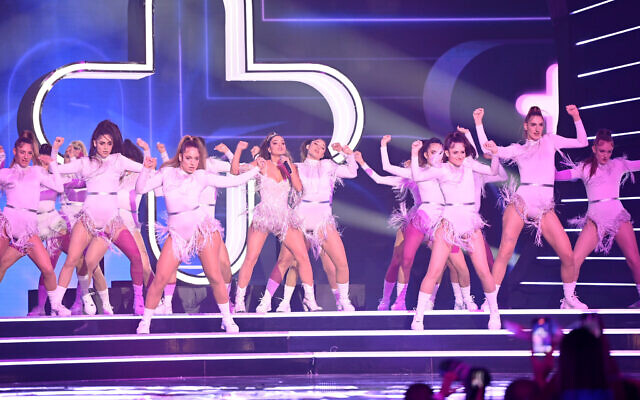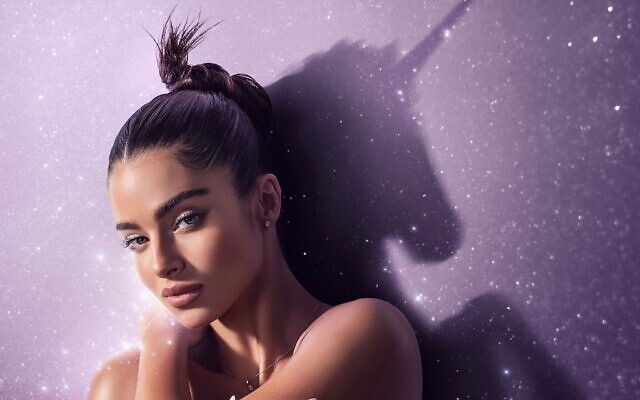Noa Kirel unveils her Eurovision song contest entry
21-year-old singer channels her inner mythical beast in music video for international song competition: ‘It’s a song that represents all of us, the whole country’
Israel’s public broadcaster has revealed the song that pop star Noa Kirel will be performing when she represents the country at the Eurovision this year in Liverpool.
Titled Unicorn, the three-minute track is largely in English with a handful of lines interwoven in Hebrew.
“I’m gonna stand here like a unicorn/ Out here on my own/ I got the power of a unicorn/ Don’t you ever learn,” she sings in the chorus. “That I won’t look back/ I won’t look down/ I’m going up/ You better turn around/ The power of a unicorn.”
The song was co-written by Kirel, Doron Medalie — who co-wrote Netta Barzilai’s 2018 Eurovision winning song Toy — Yinon Yahel and May Sfadia.
The song also includes lyrics: “History caught in a loop/ Don’t you wanna change it?/ You know that we can, you and me/ Can write a new book/ Don’t you wanna change it now?”

Kirel, 21, said the song is about a strong, independent character who can handle whatever it faces.
“I feel that in the recent period in Israel and in the world — particularly since the end of COVID — the world is moving at speed and everything is fast and you have to deal with changes really quickly,” Kirel said at an event in Eilat unveiling the song.
“We chose a character that is also mythological but is very strong and stands with its horn outward to anyone coming — and I see our country as such a strong country,” she added. “There’s something so innocent and pure about a unicorn, that in this period, we had to choose something that exists only in fairytales, in fantasies.”
The singer said she hopes the country will unite behind the song as the Eurovision Song Contest approaches.
“It’s a song that represents all of us, the whole country, so I hope and want for everyone to support this song,” Kirel said, “and feel love and excitement, and that it will touch the hearts of everyone the way it touched mine.”

While most of the lyrics in Unicorn are in English, Kirel sings a few lines in Hebrew, which translate to: “I’m not like everyone/ In front of the world.”
Kirel is slated to perform in the first Eurovision semi-final on May 9, where she will aim to get enough votes to advance to the grand final on May 13.
The UK is hosting this year’s contest after Ukraine won the 2022 song contest, and the EBU said that the war-torn country was not able to commit to safely hosting the 2023 competition. The besieged Eastern European nation is also considered a front-runner this year, represented by Tvorchi with the song Heart of Steel.
Just before the song’s reveal, Kirel was ranked in sixth place on the often-reliable Eurovision betting odds trackers. Just a couple hours after the song was released, she had dropped to seventh, with some Eurovision observers and analysts saying the song lacked cohesion.
Kirel, one of Israel’s most popular current singers, was selected last year by an internal selection committee assembled by the Kan public broadcaster. The move was a change from the past eight years, when a series of relative newcomers were chosen to represent Israel at the Eurovision via reality TV competition.
She has become known across Israel for her hit singles Pouch, Million Dollar and Panther — and released the English-language Please Don’t Suck and Thought About That in the past couple of years. Kirel completed her IDF service last year after serving as part of its “talent track,” performing for troops and pursuing her career at the same time.
The 2023 contest will mark a change in the Eurovision voting system, as the semi-final rounds will be decided solely based on televotes, instead of by a combination of jury and televoting; the grand final will still include both. And for the first time, fans in countries who do not participate in the Eurovision will be able to vote online, with their choices being collated together and weighted as coming from one country.
This year’s contest could also have political ramifications, as some lawmakers in the current Israeli government have vowed to shut down or defund Kan — which would end Israel’s membership in the European Broadcasting Union and therefore make it ineligible to take part in Eurovision going forward. The EBU has warned Israel twice in recent months against such moves.
Israel has won Eurovision four times since 1973, when it began participating: 1978, with Izar Cohen’s A-ba-ni-bi; 1979 with Milk and Honey’s Hallelujah; 1998 with Dana International’s Diva; and 2018 with Netta Barzilai’s Toy. Last year, Israel — represented by singer Michael Ben David — failed to qualify for the grand final for the first time since 2014.
Times of Israel


comments